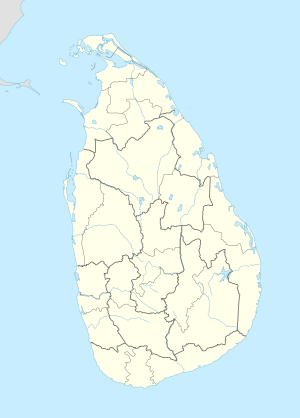| 1985 anti-Tamil violence in Karaitivu | |
|---|---|
 | |
| Location | Karaitivu, Ampara District, Sri Lanka |
| Coordinates | 7°22′0″N 81°50′0″E / 7.36667°N 81.83333°E / 7.36667; 81.83333 |
| Date | 12 April 1985 (1985-04-12) – 14 April 1985 (1985-04-14) |
| Attack type | Massacre, arson, rape |
| Weapons | guns, knives, stones, fire |
| Deaths | 11 Tamil civilians |
| Injured | 40 hospitalised, several raped, 2000 homes burned, 15,000 rendered homeless |
| Perpetrators | Sri Lankan Muslim mobs, Sri Lankan security forces |
The 1985 anti-Tamil violence in Karaitivu refers to the organised violence directed at the Tamil civilian population of Karaitivu, Ampara by Sri Lankan Muslim mobs aided by Sri Lankan security forces.
In April 1985, President J. R. Jayewardene sent M. H. Mohamed, along with his supporters to attack Tamils in the village of Karaitivu (Ampara). A mob of 3000 Sri Lankan Muslim youth with the support of the security forces killed several Tamils, raped several women and burned over 2000 Tamil homes, rendering 15,000 Tamils homeless. Shops were also looted and several Hindu temples destroyed including a temple of Pattini, where the idols were broken.
According to Muslim journalist Qadri Ismail, 11 people were killed and 40 hospitalised during the ensuing violence between 12 April and 14 April. He also visited the area a month earlier and noted there was no evidence that the Muslims had felt sufficiently threatened to resort to such violence, which would only bring them insecurity. Others accused the Tamil militant groups of extorting and abducting Muslims in the Eastern Province since 1984. Though Tamil militants also extracted money from Tamils in the north, eastern Muslims showed stronger opposition by launching a hartal in Akkaraipattu in early April 1985, which spread to other Muslim villages. This provided the government with an opportunity to incite Muslims against Tamils through the distribution of anti-Tamil leaflets. Ismail suggested some of the extortions were done by agents provocateurs.
Several politicians including K. W. Devanayagam, the Minister of Home Affairs representing the affected constituency, accused outside forces of instigating the violence. Minister S. Thondaman told the Cabinet that "7 lorries and 2 jeeps filled with thugs had gone from Colombo to the Eastern Province to provoke trouble." Muslim politician A. L. Abdul Majeed stated that certain politicians were trying to provoke ethnic conflict between the two communities who had coexisted peacefully for centuries and urged Muslims to be vigilant.
On 17 April 1985, a further 27 Tamil civilians in the area were murdered by the STF.
See also
Notes
- "The Tamil village of Karaitivu, which lies between Sainthamaruthu and Kalmunai to the north and Nintavur to the south, was attacked by Muslim mobs backed by armed men from the newly deployed Special Task Force (STF) and even an Air Force helicopter."
References
- ^ Ismail, Qadri (1985). "Sri Lanka's Ethnic Conflict and Muslims". Economic and Political Weekly. 20 (19): 830–833. ISSN 0012-9976. JSTOR 4374389.
- Miller, Phil (2020). Keenie Meenie: the British mercenaries who got away with war crimes. London: Pluto Press. pp. 158–164. ISBN 978-1-78680-584-3.
- ^ Hoole, Rajan (14 November 2014). "The East Erupts: Mossad Again?". Colombo Telegraph. Retrieved 2 November 2023.
- ^ Imtiyaz, A. R.M.; Hoole, S. R.H. (2011). "Some Critical Notes on the Non-Tamil Identity of the Muslims of Sri Lanka, and on Tamil–Muslim Relations". South Asia: Journal of South Asian Studies. 34 (2): 208–231. doi:10.1080/00856401.2011.587504. S2CID 39675436.
- ^ "POLICE COMMANDOS JOIN IN VIOLENCE" (PDF). Tamil Times. Vol. IV, no. 6. April 1985. pp. 1–19.
- ^ "VIOLENCE IN EAST SRI LANKA PLANNED AND INSTIGATED" (PDF). Tamil Times. Vol. IV, no. 7. May 1985. pp. 4–5.
- "Tamil-Muslim clashes or State-directed violence against Tamils?" (PDF). Tamil Information. Vol. 1, no. 8. 15 May 1985. p. 3.
- Tharmalingam, K.N. (November 2003). "New Year's Bloody Dawn: Karativu 1985". Northeastern Herald.
- Nuhman, M. A. (2007). Sri Lankan Muslims: Ethnic Identity Within Cultural Diversity (PDF). International Centre for Ethnic Studies. pp. 152–153. ISBN 9789555801096.